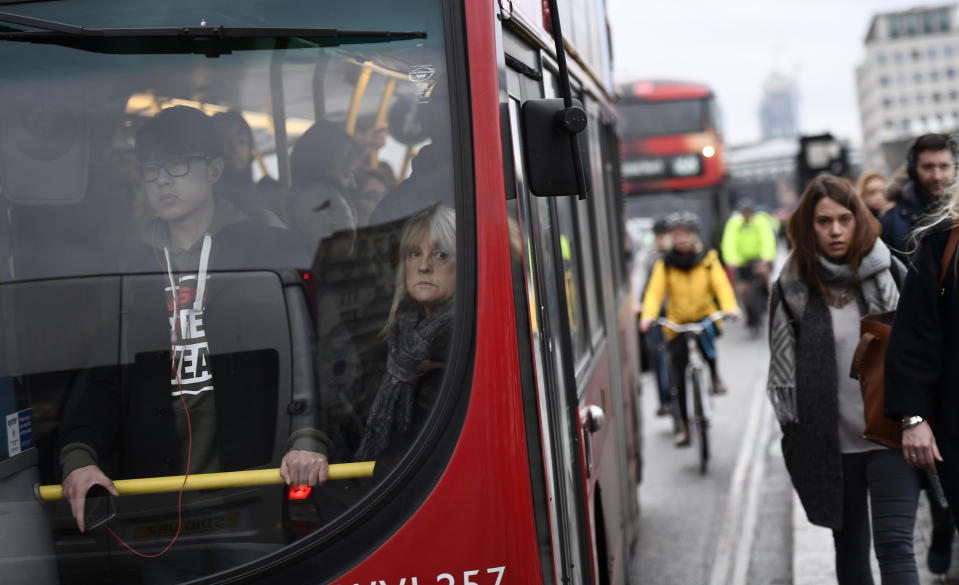Recession fears fade as UK unemployment falls to lowest rate since 1970s

The pound ticked upwards after figures showed UK unemployment falling to its joint-lowest level since the mid-1970s, despite some analysts’ fears of a recession as Britain edges towards Brexit.
The number of people unemployed and looking for work fell by 0.1 percentage points to 3.8% between May and July, according to the latest figures from the Office for National Statistics (ONS).
Britain’s workers also received their biggest average pay rise in more than 11 years, up 4% in the three months to July compared with a year earlier in its biggest rise since mid-2008.
The latest employment rate figure was unchanged at 76.1%, a joint-highest since records began in the 1970s.
The pound rose on the latest figures, but sterling was still trading 0.2% lower against the dollar on Tuesday morning in London.
READ MORE: UK economy grows faster than expected in July
Naeem Aslam, chief market analyst at TF Global Markets, said the “decent” figures had pushed sterling upwards.
“It is really astonishing how the UK’s economy is still showing its resilience in the midst of this Brexit chaos. I think it is likely that the sterling may continue its upward journey for the rest of the month,” said Aslam.
David Cheetham, chief market analyst at XTB, said wage growth reflected Britain’s tight labour market, which would normally leave the Bank of England “thinking long about raising rates in the not too distant future.”
But he said Brexit was key, and predicted no change on rates “until greater clarity is provided” about Britain’s fate as the 31 October deadline and fears of crashing out without a deal hang in the balance.
But Tej Parikh, chief economist at the Institute of Directors, warned there were "early signs the jobs boom could be cooling down."
He predicted vacancies would continue to fall, saying firms were starting to "dial down" their recruitment ambitions as the supply of workers shrinks, uncertainty lingers and firms struggle to offer higher pay.
The latest numbers come a day after new data showed better-than-expected UK GDP growth in July, which had raised hopes the economy could be holding up despite heightened political uncertainty.
READ MORE: Confidence in UK services sector slides to lowest level since Brexit vote
The British economy grew by 0.3% between June and July, according to the ONS. Economists had forecast month-on-month growth of 0.1%.
PwC’s chief economist John Hawksworth said on Monday the GDP figures suggested Britain should avoid a technical recession, two quarters of contraction, in the third quarter.
He struck a more optimistic tone than other analysts concerned “the summer’s malaise could intensify” as more recent industry surveys in August are widely seen as signals of recession.
The increased growth in July was driven by the service sector, which covers everything from hospitality to banking and is the biggest part of the UK economy.
But a subsequent survey in August, after Boris Johnson became prime minister and ratcheted up planning for a no-deal Brexit, showed confidence among managers in the services sector falling sharply over the summer. Confidence levels for the next 12 months fell to their lowest point since the 2016 referendum.
The headline figure in a widely watched survey for the construction industry’s performance also fell for a fourth month in August, dropping at the fastest rate in more than a decade.
Meanwhile new orders in the manufacturing sector plunged at their fastest rate in more than seven years, with business confidence also hitting a record low.
The trade body Make UK also warned the sector was locked in a nosedive last week, blaming a global slowdown and the Brexit crisis.
On Monday a report by KPMG warned a no-deal Brexit would be likely to plunge the economy into recession, pushing up unemployment and knocking 6% off house prices.
Last month a slight increase in unemployment in the ONS figures had prompted one expert to warn the “glory years appear to be over” for a record period of jobs creation in the UK labour market, despite concerns about growing insecure work and a self-employment boom.

 Yahoo Sport
Yahoo Sport 





































